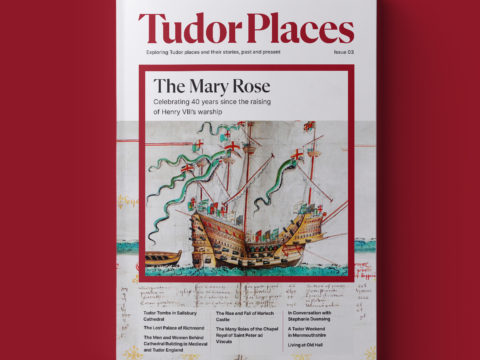Katherine Willoughby: Life Story
Chapter 8 : Tragedy
On this occasion, Somerset was released from the Tower, but his power base transferred to Warwick, who became Duke of Northumberland. Northumberland, perhaps to indicate positive feelings towards Somerset and Katherine, suggested a match between Somerset’s daughter, Lady Anne Seymour, and Katherine’s son, Henry, Duke of Suffolk.
Katherine was decidedly against the idea. In a letter that hints at a less-than-happy experience of matrimony she wrote:
‘…marrying by our orders and without their consents, as they be yet without judgement to give such consent as ought to be given in matrimony, I cannot tell what more unkindness one of us might show another, or wherein we might work more wickedly than to bring our children into so miserable a state not to choose by their own liking..’
She went on to say how much she personally would like the match to take place and hoped that the young couple would fall in love and wish to marry. Somerset, less particular in the matter of marriage for love, arranged for his daughter to marry Northumberland’s son instead. Despite this apparent rapprochement, Somerset was executed in January 1552.
With no wedding in prospect, young Henry Suffolk and his brother, Charles, were sent by Katherine to study at St John’s College, Cambridge – founded by Lady Margaret Beaufort, and the alma mater of many of the sixteenth century reformers.
Katherine, unwilling to be too far from her sons, rented a house in Kingston, a village about seven miles east of the university city. Whilst there, she made the acquaintance of Martin Bucer, a widely-respected Protestant, who had been invited by Archbishop Cranmer to take up a position at Cambridge. Bucer was a great influence on Katherine’s step-son-in-law, the Marquis of Dorset, and his daughter, Lady Jane Grey.
The friendship did not have long to grow – Bucer died in early 1551, the first death in what, for Katherine, was a terrible year. At the end of the summer, an epidemic of the mysterious ‘sweating sickness’ broke out in Cambridge. Henry and Charles left the city for Kingston, and then, perhaps because Katherine was ill, went on to Buckden.
Presumably, Katherine’s illness was not sweating sickness, as she was well enough to rush to Buckden when she heard that her sons were ill. She was too late to see Henry, who died on the morning of 14th July, 1551, to be followed before the day was out, by Charles. They were 15 and 14 years old respectively.
Katherine was distraught. She could not eat or sleep, shut herself away from her friends and grieved bitterly. Some small comfort may have been derived from the golden opinions that everyone who mattered to Katherine appeared to have of her sons – their learning, their wisdom, and their ‘godliness’ were all praised. Of course, those who disagreed with Katherine’s religion, and who had felt her sharp tongue, were less charitable, seeing her loss as a punishment from God, whilst her friends saw it as a sign rather of God’s favour that her sons were free from the evils of the world.
This sense of God’s purpose being revealed in the loss of her sons, enabled Katherine to write to Cecil that she could not help but
‘to seem sorry for that whereof I know I ought rather to rejoice…’ but that she truly [took] this last (and to the first sight, most sharp and bitter) punishment not for the least of His benefits; inasmuch as I have never been so well taught by any other before to know His power, His love and mercy, my own weakness and that wretched state that without Him.
Katherine’s correspondence with Cecil continued – he was now in favour with the Duke of Northumberland, and well placed to support her suits for friends and servants and her desire to obtain a dissolved chantry, founded by her family. A key beneficiary of her letters was her distant relative Sir William Naunton, once a member of her late husband’s household.
Her requests for help did not fall on deaf ears:
‘What you have done for me in cousin Naunton’s cause, even so much when I think on it, I shall blush that I am in no ways able to requite your gentleness but with my hearty thanks, which be not the worth receiving of such a benefit’
To thank Cecil, she sent him a buck from Grimsthorpe to Cecil, along with an open invitation to hunt there with friends whenever he chose.
The loss of Katherine’s sons also changed her financial position. The lands of the duchy of Suffolk reverted to the crown – they remained in the family, however, as Henry Grey, Marquis of Dorset, husband of her step-daughter, France Brandon, was granted the title. Katherine continued to be on excellent terms with the couple and they spent the Christmas of 1551 together, along with Henry and Frances’ three daughters, the eldest of whom, Jane, was of one mind with Katherine on religious matters.
Katherine Willoughby
Family Tree




